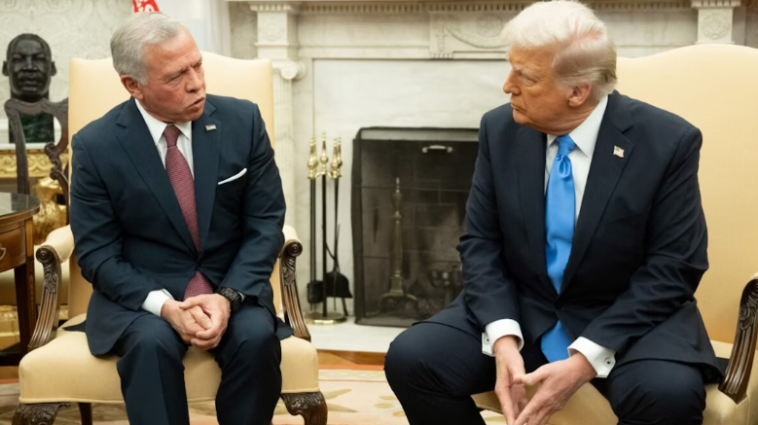In a key diplomatic development, King Abdullah II of Jordan has agreed to accept 2,000 critically ill children from Gaza for medical treatment following a high-level meeting with President Donald Trump at the White House. The commitment, which comes amid ongoing discussions about the humanitarian crisis in Gaza, was met with praise from President Trump, who called it “a beautiful decision” and “music to my ears.”
Trump and King Abdullah Discuss Refugee Crisis and Regional Stability
The White House meeting focused on addressing the worsening humanitarian conditions in Gaza and exploring possible solutions for displaced Palestinians. President Trump has previously proposed that neighboring Arab nations, including Jordan and Egypt, could help manage the crisis by providing temporary refuge to those affected by the conflict.
Trump emphasized that any U.S.-led redevelopment efforts in the region would not involve purchasing land but would focus on economic revitalization and stability. “We want to help create a thriving and safe environment for the people of Gaza, but this requires cooperation from regional partners,” Trump stated.
Jordan Maintains Opposition to Permanent Displacement
While King Abdullah’s agreement to take in sick children for medical care was a significant humanitarian gesture, he remained firm in his opposition to any permanent displacement of Palestinians from Gaza. Jordan has long resisted any proposals that suggest resettling large numbers of Palestinians outside their homeland, aligning with the positions of other Arab nations that stress the importance of Palestinian sovereignty.
“We will continue to support humanitarian efforts, but the future of Gaza’s people must remain in Gaza,” King Abdullah reportedly stated during the meeting.
Balancing Humanitarian Aid with Regional Politics
The agreement to provide medical care for critically ill Palestinian children in Jordan highlights the complex balancing act facing regional leaders. While Jordan is offering assistance, the broader issue of long-term displacement remains politically sensitive.
Trump’s administration has signaled that the U.S. remains committed to finding practical solutions to the crisis while ensuring regional stability. “This is about saving lives and bringing peace to the region, but it must be done in a way that respects national sovereignty and long-term security interests,” a senior administration official said following the meeting.
Conclusion: A Step Toward Cooperation
While the meeting between Trump and King Abdullah did not resolve all disputes regarding the future of Gaza, the commitment to providing medical aid is a positive step in regional cooperation. As the situation in Gaza continues to unfold, the role of neighboring nations in addressing the crisis will remain a crucial element of U.S. foreign policy.
The coming months will determine how this humanitarian initiative evolves and whether further agreements can be reached to ease the suffering of those caught in the ongoing conflict.


